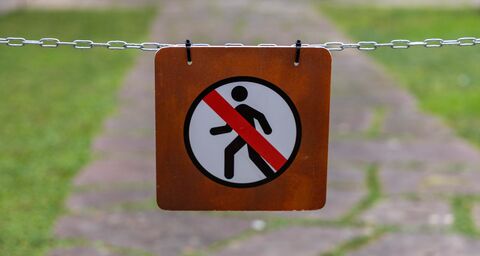
-
 At home
At homeDisputing a testimonial: Your rights
-
 At home
At homePatient rights: what you should know
-
 At home
At homeSIM swapping: how to protect yourself
-
 At home
At homeWhat are deepfakes and how can you protect yourself?
-
 At home
At homeContesting termination without notice: What you should look out for
-
 At home
At homeGeneral power of attorney: comprehensive power of attorney for a person of trust
-
 At home
At homeBreak regulations in Switzerland: guidelines for a restful break
-
 At home
At homeCompulsory portion of heirs: what applies in Switzerland
-
 At home
At homeAdvance on inheritance in Switzerland: Passing on assets while you’re alive
-
 At home
At homeRent increase – how legal protection insurance can help you
-
 At home
At homeExcessive noise in your neighborhood: What you can do about disturbances of the peace
-
 At home
At homeInheriting in Switzerland: Inheritance law, order of succession and useful information
-
 At home
At homeVacation entitlement in Switzerland: your right to free time
-
 At home
At homeLiving as a patchwork family: What you need to bear in mind
-
 At home
At homeQuishing: QR code fraud
-
 At home
At homeCompleting your tax return: Tips on all tax-related matters
-
 At home
At homeCustody – everything parents need to know
-
 At home
At homeOnline shopping: here’s how to protect yourself against the risks of shopping on the internet.
-
 At home
At homeHow to protect yourself and your child against cyber bullying
-
 At home
At homeAdvance payment fraud Caution advised for online trade with animals
-
 At home
At homeFake shops: how to protect yourself against online fraud
-
 At home
At homeTop tips for a secure password
-
 At home
At homeBullying at the workplace
-
 At home
At homeSkiing accident: When does insurance pay?
-
 At home
At homeWhat you should take into account when handing over your apartment
-
 At home
At homeApply for an inheritance certificate: here’s how it works
-
 At home
At homeDo not enter! Unlawful entry in Switzerland
-
 At home
At homeWhat do I need to know when I give my landlord notice?
-
 At home
At homeTenancy law: what are my rights and obligations as a tenant?
-
 At home
At homeCalculating support payments: How much child support do you have to pay?
-
 At home
At homeMold in your apartment – what can you do and who should pay for it?
-
 At home
At homeVishing – a particularly sneaky form of cyber fraud
-
 At home
At home“Phishing fraud can hit anyone”
-
 At home
At homeEmployment contract: You should note these 10 things
-
 At home
At homeShells, corals, leatherware: what you must be aware of when bringing souvenirs into the country
-
 At home
At homeHere’s to being a good neighbor! Helpful answers about neighbor law
-
 At home
At homeIs the moving company liable for damage?
-
 At home
At homeCredit card fraud: How can I protect myself?
-
 At home
At homeSick while on vacation – when are you entitled to reclaim lost vacation days?
-
 At home
At homeBuying a knife online: Which weapons are banned in Switzerland?
-
 At home
At homeWhen doctors make treatment errors
-
 At home
At homeOnline love scams: How do romance scammers set about their scams?
-
 At home
At homeYouth protection: What are the rights and obligations of young people?
-
 At home
At homeWills, inheritance, funerals: Answers to frequently asked legal questions
-
 At home
At homeWinter service: Who has to clear snow when and how often?
-
 At home
At homeDrink-driving: What is the drink drive limit?
-
 At home
At homeWhen and now can I revoke a purchase agreement?
-
 At home
At homeCaution when Christmas shopping online
-
 At home
At homeOnline subscription traps: how to protect yourself
-
 At home
At homeLeaf blowers, mushroom foraging, etc: Answers to legal questions that the fall brings
-
 At home
At homeIn love – but not married? Take note of the legal implications of cohabiting
-
 At home
At homeAccident or long-term illness: What does this mean for my job?
-
 At home
At homeWorking from home: what are your rights and obligations?
-
 At home
At homeRights and obligations of apprentices and companies providing apprenticeships
-
 At home
At homeFamily law – Answers regarding custody, child support and co.
-
 At home
At homeHave you received notice of termination? Tips for reporting to the REO
-
 At home
At homeCoronavirus: who pays due to illness from Covid-19?
-
 At home
At homeNotice period in case of illness
-
 At home
At homeSubletting with Airbnb: What needs to be considered?
-
 At home
At homeDelivery deadline for termination notice
-
 At home
At homeAre you interested in taking in refugees from Ukraine? What you should know
-
 At home
At homeRight of severance: Just one snip – and the branch is gone
-
 At home
At homePatents: how do I protect my idea?
-
 At home
At homeWhen house pets become a cause of dispute: what you need to know
-
 At home
At homeProviding relatives with financial support: when do family members have to pay?
-
 At home
At homeCopyright law and the Internet: What is allowed?
